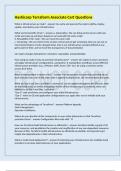Exam (elaborations)
Hashicorp Terraform Associate Cert Questions
What is Infrastructure as Code? - answer-You write and execute the code to define, deploy, update, and destroy your infrastructure
What are the benefits of IaC? - answer-a. Automation -We can bring up the servers with one script and scale up and down based on our load with the same script.
b. ...
[Show more]
Preview 2 out of 12 pages
-
August 26, 2024
-
12
-
2024/2025
-
Exam (elaborations)
-
Questions & answers
-
Hashicorp T
-
Hashicorp T
Hashicorp Terraform Associate Cert Questions
What is Infrastructure as Code? - answer-You write and execute the code to define, deploy,
update, and destroy your infrastructure
What are the benefits of IaC? - answer-a. Automation -We can bring up the servers with one
script and scale up and down based on our load with the same script.
b. Reusability of the code - We can reuse the same code
c. Versioning - We can check it into version control and we get versioning. Now we can see an
incremental history of who changed what, how is our infrastructure actually defined at any
given point of time, and we have this transparency of documentation
IaC makes changes idempotent, consistent, repeatable, and predictable.
How using IaC make it easy to provision infrastructure? - answer-IaC makes it easy to provision
and apply infrastructure configurations, saving time. It standardizes workflows across different
infrastructure providers (e.g., VMware, AWS, Azure, GCP, etc.) by using a common syntax
across all of them.
What is Ideompodent in terms of IaC? - answer-The idempotent characteristic provided by IaC
tools ensures that, even if the same code is applied multiple times, the result remains the same.
What are Day 0 and Day 1 activities? - answer-IaC can be applied throughout the lifecycle, both
on the initial build, as well as throughout the life of the infrastructure. Commonly, these are
referred to as Day 0 and Day 1 activities.
"Day 0" code provisions and configures your initial infrastructure.
"Day 1" refers to OS and application configurations you apply after you've initially built your
infrastructure.
What are the advantages of Terraform? - answer-Platform Agnostic
State Management
Operator Confidence
Where do you describe all the components or your entire datacenter so that Terraform
provision those? - answer-Configuration files ends with *.tf
How can Terraform build infrastructure so efficiently? - answer-Terraform builds a graph of all
your resources, and parallelizes the creation and modification of any non-dependent resources.
Because of this, Terraform builds infrastructure as efficiently as possible, and operators get
insight into dependencies in their infrastructure.
What is multi-cloud deployment? - answer-Provisioning your infrastructure into multiple cloud
providers to increase fault-tolerance of your applications.
, How multi-cloud deployment is useful? - answer-By using only a single region or cloud provider,
fault tolerance is limited by the availability of that provider.
Having a multi-cloud deployment allows for more graceful recovery of the loss of a region or
entire provider.
What is cloud-agnostic in terms of provisioning tools? - answer-cloud-agnostic and allows a
single configuration to be used to manage multiple providers, and to even handle cross-cloud
dependencies.
What is the use of terraform being cloud-agnostic? - answer-It simplifies management and
orchestration, helping operators build large-scale multi-cloud infrastructures.
What is the Terraform State? - answer-Every time you run Terraform, it records information
about what infrastructure it created in a Terraform state file.
By default, when you run Terraform in the folder /some/folder, Terraform creates the file
/some/folder/terraform.tfstate.
This file contains a custom JSON format that records a mapping from the Terraform resources
in your configuration files to the representation of those resources in the real world.
What is the purpose of the Terraform State? - answer-Mapping to the Real World - Terraform
requires some sort of database to map Terraform config to the real world because you can't
find the same functionality in every cloud provider. You need to have some kind of mechanism
to be cloud-agnostic
Metadata - Terraform must also track metadata such as resource dependencies, pointer to the
provider configuration that was most recently used with the resource in situations where
multiple aliased providers are present.
Performance - When running a terraform plan, Terraform must know the current state of
resources in order to effectively determine the changes that it needs to make to reach your
desired configuration.
For larger infrastructures, querying every resource is too slow. Many cloud providers do not
provide APIs to query multiple resources at once, and the round trip time for each resource is
hundreds of milliseconds. So, Terraform stores a cache of the attribute values for all resources
in the state. This is the most optional feature of Terraform state and is done only as a
performance improvement.




